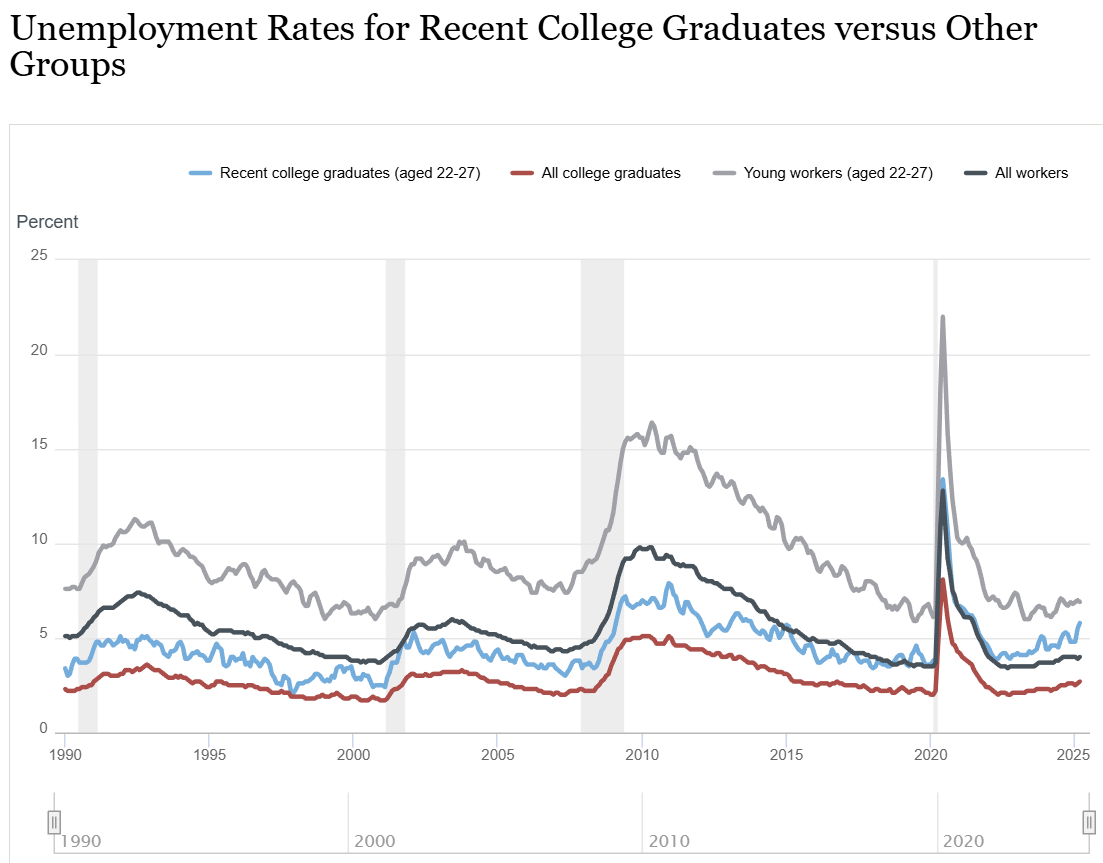
Why Learning Centers Should Take the Lead on AI Fluency
With the right guidance, students can extract real value from AI, both in quality learning and career preparation. Colleges are moving slowly here, so I advocate for learning centers to take the lead on AI fluency.
The labor market for colleges grads has flipped: unemployment rates for recent students are up to 5.9%, much higher than that of the general population (link, link, link).
Many attribute this to the rise of AI, threatening to automate the repetitive work that traditionally would be done by college grads. The value of a college degree appears to be lessening.
In contrast to this narrative, I believe that AI can increase the value of a college degree if colleges embrace the technology and integrate AI fluency education into the student experience.
In this piece, I’ll argue that:
- AI fluency is critical to remaining competitive in the labor market
- Educating students on AI is a key opportunity for colleges to improve their value proposition
- The learning center is the perfect place to prototype and roll out early training for students on AI fluency
Is AI overhyped?
Many people are skeptical of AI living up to the lofty promises being made, and the tendency is to write off the technology as a whole due to this hype cycle and disappointing early experiences.
This would be a mistake. AI is almost certainly a world-changing technology on the order of the internet or the smartphone. It is a “platform shift,” meaning many new things will be built on top of it, and soon we’ll all be using tools built natively for interacting with these AI models that are becoming increasingly user-friendly.
My own skepticism on the real-world value of AI has been eroding due to a number of “wow” moments recently. Learning how these models work (as glorified next-word predictors), the right ways to talk to them (prompting), and the tools being built on top of them has allowed me to realize real value.
If I, as a technology CEO, am only now understanding the possibilities, it’s likely that most people have yet to unlock value themselves.
This presents an opportunity. The vast majority of people are still “behind the curve” on AI adoption. Those who put in the work now will have a competitive edge for years to come.
A couple of practical examples
Here are two recent use cases that have opened my eyes to the real-world value of AI:
1. Let AI build a custom application for your workflow. Tools like lovable.dev can now build a custom software application for you based on text instructions alone. You can chat with it to update the app, adding buttons or changing copy, thereby creating software that fits a specific workflow perfectly. I recently built an app that smooths out a key step in my content creation process for pieces like this. It took 30 minutes.
2. Automate repetitive "fuzzy" tasks. Here’s a recent example. When someone books a Penji demo on our website, a team member used to manually search the web for the person's learning center, find its URL, and update our CRM. Now, using a tool called Zapier, we’ve created an automation. The form submission is sent to an AI with a prompt to search the web and find that information, which is then formatted and sent directly to our CRM. AI can now handle basic logic and web searches, automating fuzzy tasks that once required human judgment and cutting down about 15 minutes of work for every demo that comes through. This AI automation is done through simple drag and drop editors that anyone can manage.
The difficult job market for new college grads
The nature of entry level work is changing. The unemployment rate for young college graduates is considerably higher than that of the general population—a complete reversal of long-standing trends, as reported by the New York Fed. This is a statistical reality that is causing a national conversation about the value of a college degree.

This is the reality today's students are graduating into. In this new landscape, the value of a degree is no longer just about the diploma; it's about the skills that make a graduate more valuable than baseline automation.
That skill, in my view, is AI fluency. This is not just about using ChatGPT to write an email. It’s about leveraging AI for complex data analysis, automating repetitive tasks, and generating creative solutions. As a recent PBS NewsHour report noted, firms like KPMG are already using AI to handle "grunt work."
The students who can walk into an internship or their first job knowing how to leverage AI will be more productive and valuable from day one.
The age of AI presents a golden opportunity for colleges to improve their value proposition
While the current narrative is doom and gloom for colleges, I believe that AI can allow colleges to flip the narrative about the diminishing value of their degrees—if colleges embrace AI as a key part of their educational curriculum and experience, and recognize the value that expertise here will bring to their students in the labor market.
Like what you're reading?
Subscribe to our newsletter and receive new posts directly to your inbox.
Colleges have moved too slowly to define their posture on AI
While the need for AI fluency is clear, most colleges are struggling to create coherent, campus-wide policies. An EDUCAUSE study found that just 23% of colleges had an acceptable-use policy in place as of late 2024. An Inside Higher Ed survey found that 3 in 10 students are unclear on how they are supposed to use AI in the classroom. The ones that do exist often focus narrowly on academic integrity and plagiarism, leaving a void when it comes to proactively teaching students how to use these tools productively.
Learning centers should take the lead on AI fluency education
Learning centers should take the lead for three reasons:
- Agility: Learning centers have the flexibility to adjust programming, offer new workshops, and experiment with new teaching methods without the long approval cycles of formal curriculum changes. You can respond to the pace of technology in weeks, not years.
- Tutor Expertise: Your peer tutors are students themselves. They are often early adopters who are already using these tools for their own work. They can be trained to become credible, relatable AI mentors who understand the exact academic challenges their peers face.
- Mission Alignment: Your core mission is to help students learn how to learn. Teaching them to properly use the tools at their disposal—from a textbook to a peer tutor to an AI model—is a natural extension of your work.
I’ve recently interviewed 8 different students on their AI usage and perspectives. Isabelle, a public health graduate from Tulane, had a great perspective on this technology, both for school and work. Below is our full 10 minute discussion on AI, with more specific clips further down.

Here are a few of the use cases shared by Isabelle that can provide genuine value to students:
- Synthesize Diverse Information: Students are drowning in browser tabs and PDF files. As Isabelle described, she uses AI to synthesize study guides. Instead of juggling dozens of sources, she prompts it: "give me a one-page study guide on these seven concepts, compare and contrast them... put these in this setting and this setting." This helps you efficiently build a highly relevant single document for studying rather than copying and pasting for many hours.

- Dig Deeper on Concepts: When faced with abstract policy, Isabelle uses AI to make it concrete. For her health policy class, she would copy a slide into ChatGPT and ask for real-world examples: “Let’s say in a health policy class I’m learning about the Affordable Care Act. I’d paste the slide into ChatGPT, and ask for real-world examples where a person would get [certain health benefits in certain scenarios].” This is a perfect example of how AI can be used for real learning.

- Career Support: Isabelle also noted that the most motivating factor for students is often career preparation, and that ChatGPT has been useful in resume work, interview prep, and other job search processes.

A proposed curriculum for AI fluency
This may feel daunting, especially if you don’t feel knowledgeable on AI. The first thing to realize: almost nobody is. This is a wide-open field at this stage. I propose that learning center professionals educate themselves in this arena seriously. This will allow you to provide an invaluable service to students, and I believe it will benefit you in your career as well.
Here is a curriculum brainstorm to get us started. This can be a series of workshops, or the material can be used to train your tutors to help students one-on-one:
- The Fundamentals: Start by demystifying the tool. Explain that AI is not a magic answer box or a fact database, but is really like the world's most advanced autocomplete, guessing the most likely word that will come next in a sentence. This single concept is the key to understanding why AI can "hallucinate" or confidently state incorrect information. It builds the healthy skepticism required for critical use. For your own knowledge here, this video is long, but it is an incredible resource for understanding the basics of AI models yourself. The first hour is the most important for the fundamentals.
- Prompt Engineering: Quality outputs depend on quality inputs. Teach students how to provide roles ("Act as a skeptical historian"), context ("I am studying for a final on the American Revolution"), constraints ("Explain this in three simple paragraphs"), and examples of the output format that they want to receive to get better results.

- Avoiding Math Errors: Large Language Models are notoriously bad at precise math. A key workaround is to ask the AI to write and execute code to solve the problem. A workshop on this can show students in STEM and business fields how to get reliable answers for quantitative problems.
- The Ethical Toolkit: This workshop must cover the practical ethics of AI use. Provide clear guidelines on how to properly cite AI-generated content, demonstrate methods for fact-checking AI outputs against primary sources, and discuss using AI as a brainstorming partner without crossing the line into plagiarism.
- Workshop Spotlight: Academic Workflows: Dedicate a session to a start-to-finish academic project using the "Isabelle Method." Have students bring a research paper or a list of topics from their own class and walk them through using AI to build a study guide, get conceptual examples, and create practice quiz questions.
- Workshop Spotlight: The Career Accelerator: Host a workshop focused entirely on using AI for the job hunt. Show students how to feed a job description into an AI to get keywords for their resume, how to generate a tailored first draft of a cover letter, and how to create mock interview questions based on the company's mission statement.
The emergence of AI tools, both for learning and for career use cases, will be of genuine value for students who use them effectively. This is an opportunity for colleges to help students who are looking for practical guidance.
While college leadership is likely to be slow in updating curriculum to adapt, learning centers are in a great position to lead the charge and fill a critical need. It’s scary and new, but diving right in and trusting that you can figure it out will pay real dividends to your students.
I would love to help create this curriculum in more detail and roll out some of these trainings - please email me at ben.h@penjiapp.com if you’d like to be involved in some of the early communities and beta groups for doing this.
Thanks for reading!









